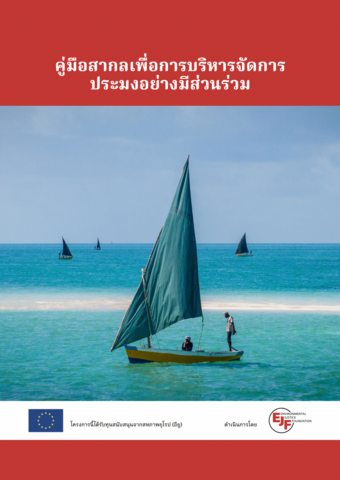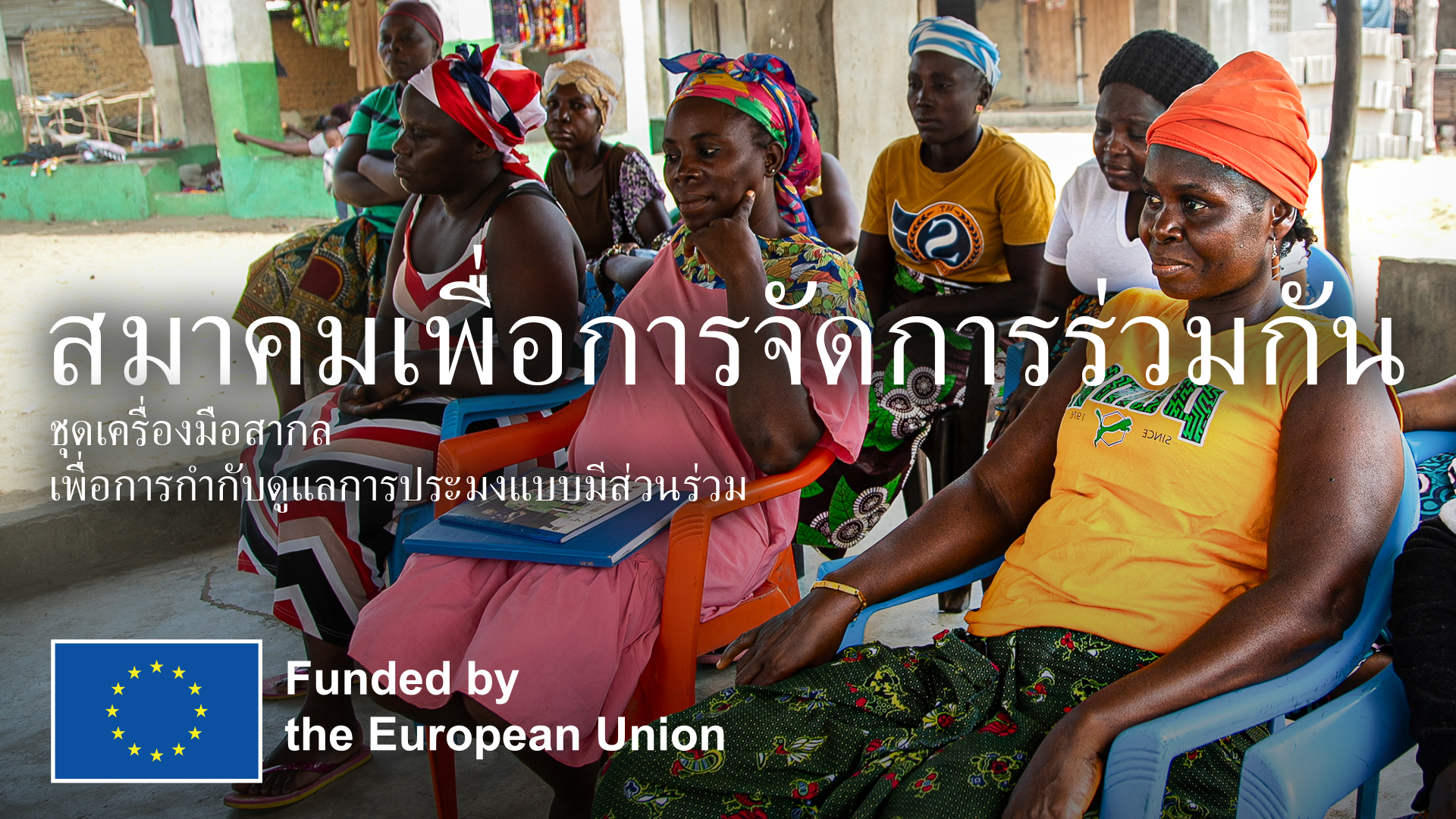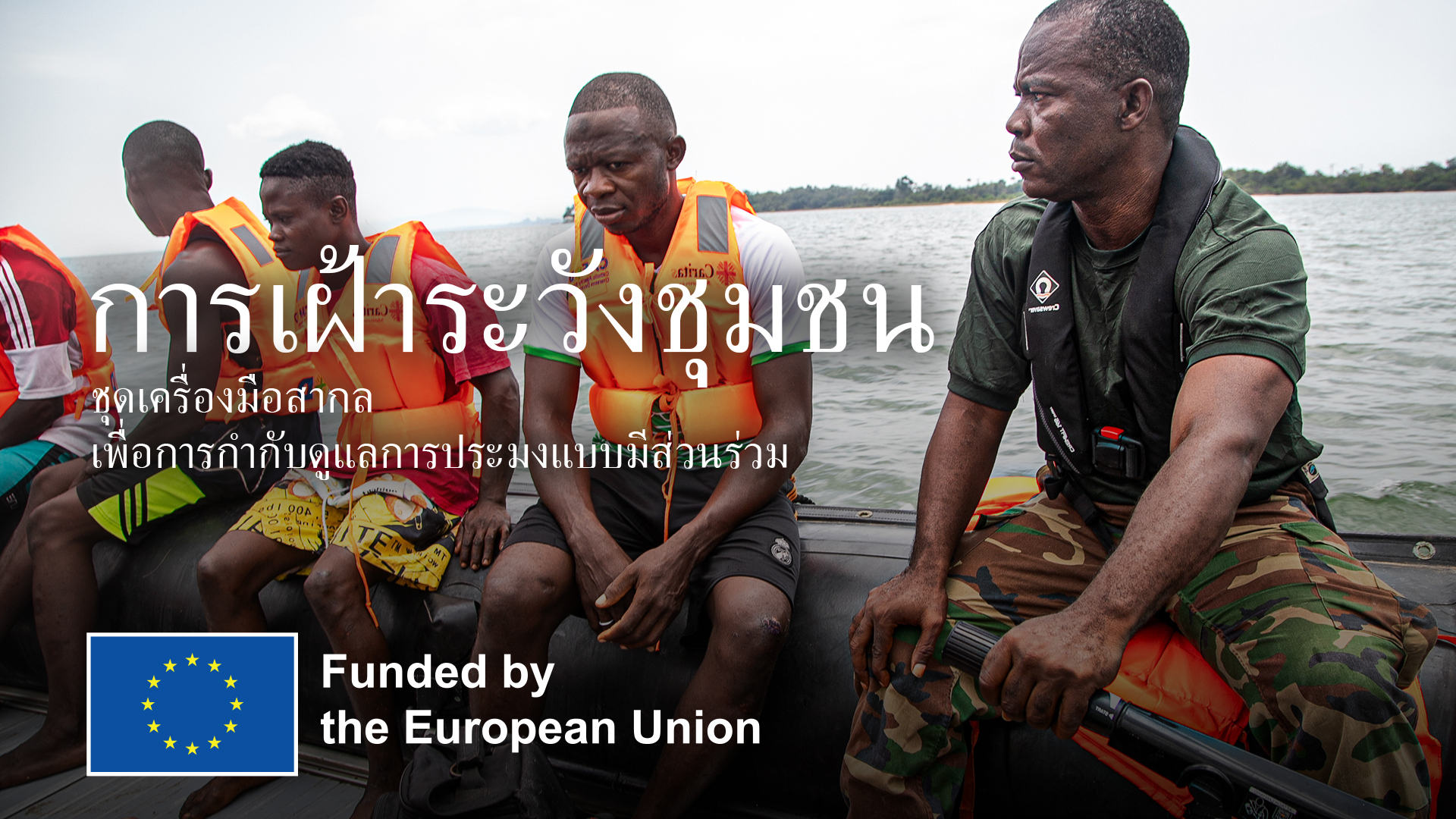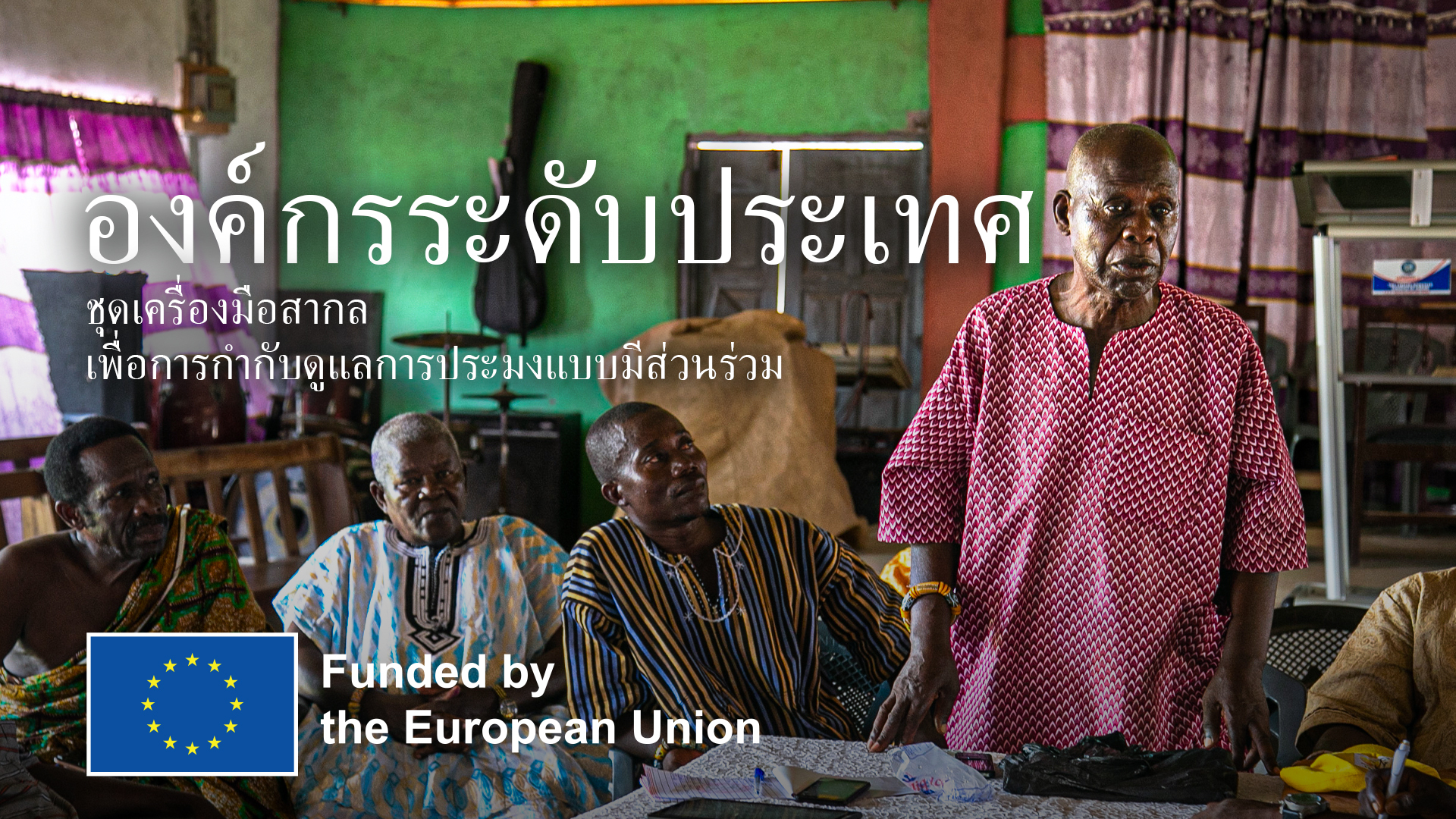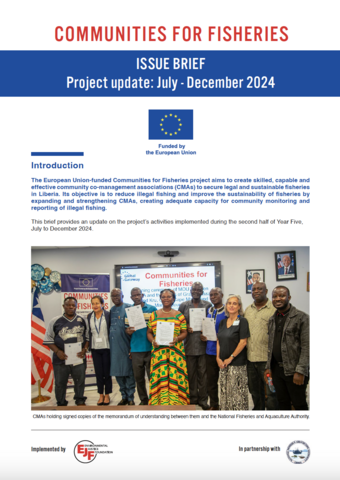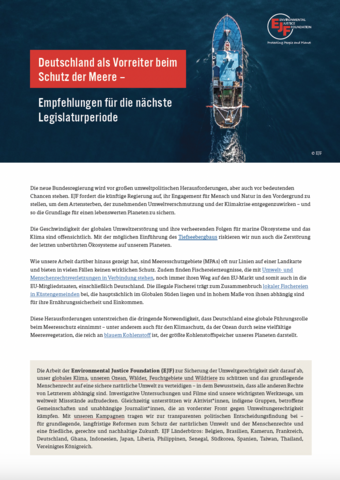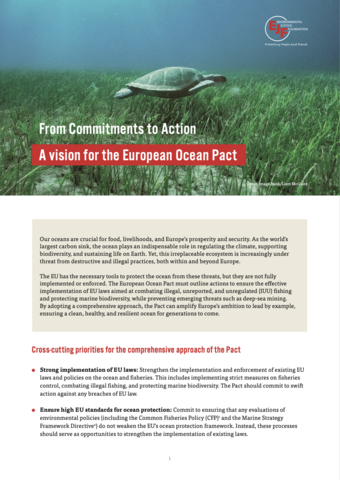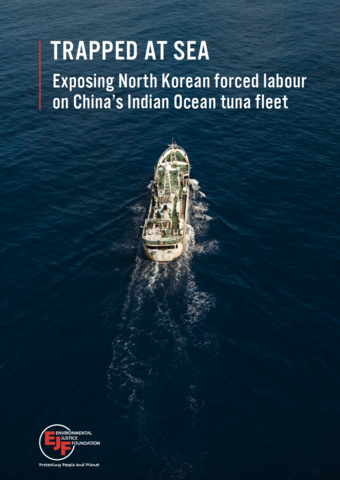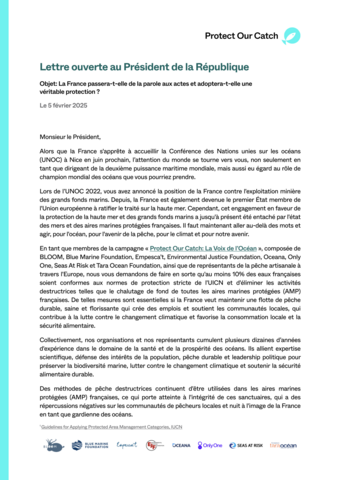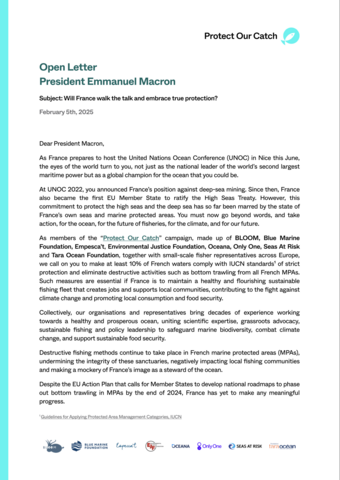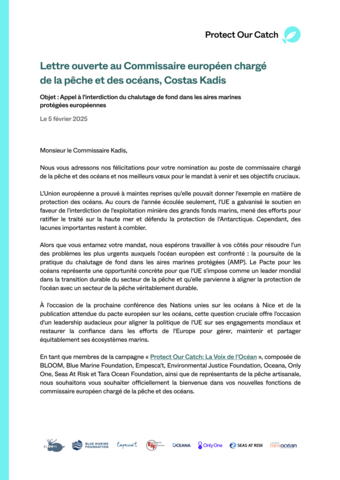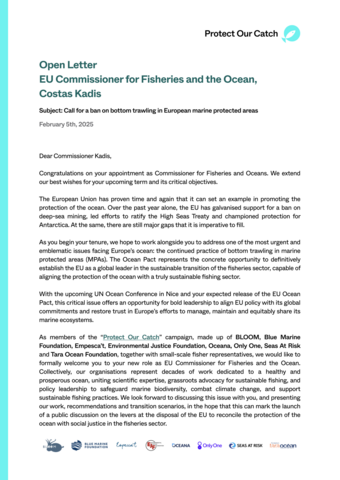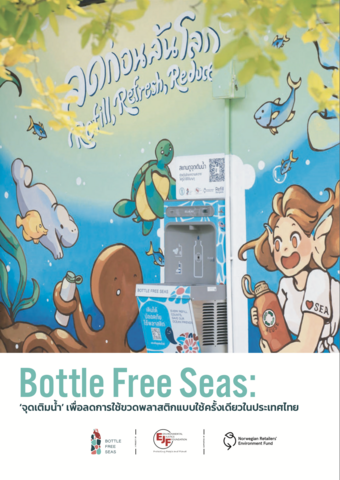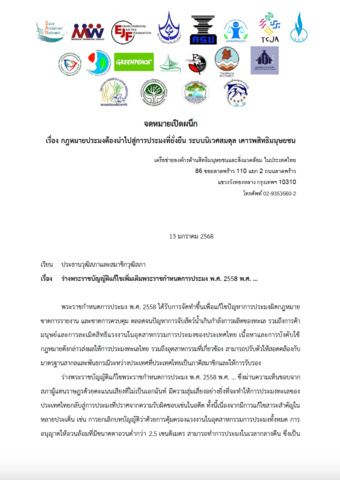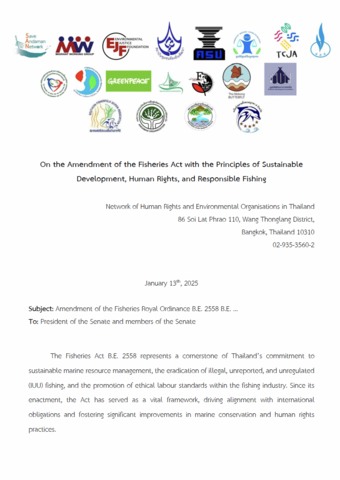เครื่องมือที่ใช้ในระดับนานาชาติ เพื่อสร้างการบริหารจัดการแบบมีส่วนร่วม: คู่มือฉบับนี้จัดทำขึ้นโดยมูลนิธิความยุติธรรมเชิงสิ่งแวดล้อม (Environmental Justice Foundation: EJF) โดยได้รับทุนสนับสนุนจาก สหภาพยุโรป (EU) ทำหน้าที่ให้แนวทางความรู้เฉพาะด้านสำหรับผู้ปฏิบัติงานที่ทำงานร่วมกับชุมชนประมงรายย่อย โดยมีเป้าหมายเพื่อเสริมสร้างศักยภาพของคนกลุ่มนี้ในการต่อสู้กับการทำประมง ผิดกฎหมาย ขาดการรายงาน และไร้การควบคุม (IUU) รวมถึงทำงานเพื่อสร้างการประมงที่ยั่งยืน ถูกกฎหมาย และมีจริยธรรม
Communities for Fisheries issue brief: July to December 2024 project update: The European Union-funded Communities for Fisheries project aims to create skilled, capable and effective community co-management associations (CMAs) to secure legal and sustainable fisheries in Liberia. This brief summarises the project’s activities during the second half of Year Five, July to December 2024.
Deutschland als Vorreiter beim Schutz der Meere – Empfehlungen für die nächste Legislaturperiode: Um unsere Zukunft zu sichern, müssen wir dafür sorgen, dass sich unsere Meere erholen und weiter gedeihen können. Dieses Kurzbriefing zeigt auf, wie die neue Bundesregierung in wichtigen Bereichen handeln kann, um unsere Meere und die Menschen, die von ihnen abhängig sind, zu schützen.
From Commitments to Action: A vision for the European Ocean Pact: The ocean is increasingly under threat from destructive and illegal practices, both within and beyond Europe. The EU has the necessary tools to protect the ocean from these threats, but they are not fully implemented or enforced. The European Ocean Pact must outline actions to ensure the effective implementation of EU laws aimed at combating illegal, unreported, and unregulated (IUU) fishing and protecting marine biodiversity, while preventing emerging threats such as deep-sea mining.
Trapped at sea: exposing North Korean forced labour on China’s Indian Ocean tuna fleet: This briefing finds that a fleet of Chinese tuna fishing vessels operating in the Indian Ocean reportedly used North Koreans as crew between 2019 and 2024, likely violating UN sanctions. Many were apparently subjected to abuses, including being trapped at sea for up to a decade, on vessels involved in illegal fishing and the killing of dolphins.
Lettre ouverte au Commissaire européen chargé de la pêche et des océans, Costas Kadis: Dans cette lettre ouverte, les membres de la campagne Protect Our Catch, dont le EJF, demandent au commissaire européen chargé de la pêche et des océans, Costas Kadis, de prendre des mesures pour mettre fin au chalutage de fond dans les AMP de l'UE.
รายงานโครงการ Bottle Free Seas “จุดเติมน้ำ” เพื่อลดการใช้ขวดพลาสติกแบบใช้ครั้งเดียวในประเทศไทย: รายงานฉบับนี้บันทึกการเดินทางของโครงการ Bottle Free Seas ในการส่งเสริมแนวทาง รีฟิล (Refill) และใช้ซ้ำ (Reuse) ในประเทศไทย โดยสรุปผลการดำเนินงาน ความท้าทาย และโอกาสในการขยายผล พร้อมแนวทางปฏิบัติและรายการข้อเสนอแนะ เพื่อสนับสนุนองค์กรปกครองส่วนท้องถิ่น เทศบาล จังหวัด และภาคเอกชน ในการพัฒนานโยบายและติดตั้งจุดเติมน้ำดื่ม
จดหมายเปิดผนึก เรื่อง กฎหมายประมงต้องน าไปสู่การประมงที่ยั่งยืน ระบบนิเวศสมดุล เคารพสิทธิมนุษยชน: การแก้ไขพระราชบัญญัติการประมงของไทยอาจส่งผลกระทบต่อความก้าวหน้าในการปราบปรามการทำประมงผิดกฎหมาย ขาดการรายงาน และไร้การควบคุม การปกป้องระบบนิเวศทางทะเล และการรักษาสิทธิแรงงาน จดหมายเปิดผนึกฉบับนี้จากองค์กรภาคประชาสังคม 57 แห่ง รวมถึง EJF เรียกร้องให้วุฒิสภาพิจารณาทบทวนอีกครั้ง
Open letter on the amendment of Thailand's Fisheries Act and the principles of sustainable development, human rights and responsible fishing: Proposed amendments to Thailand's Fisheries Act risk undoing progress in combatting illegal, unreported, and unregulated fishing, protecting marine ecosystems, and upholding labour rights. This open letter from 57 civil society organisations, including EJF, urges the Senate to reconsider them.
